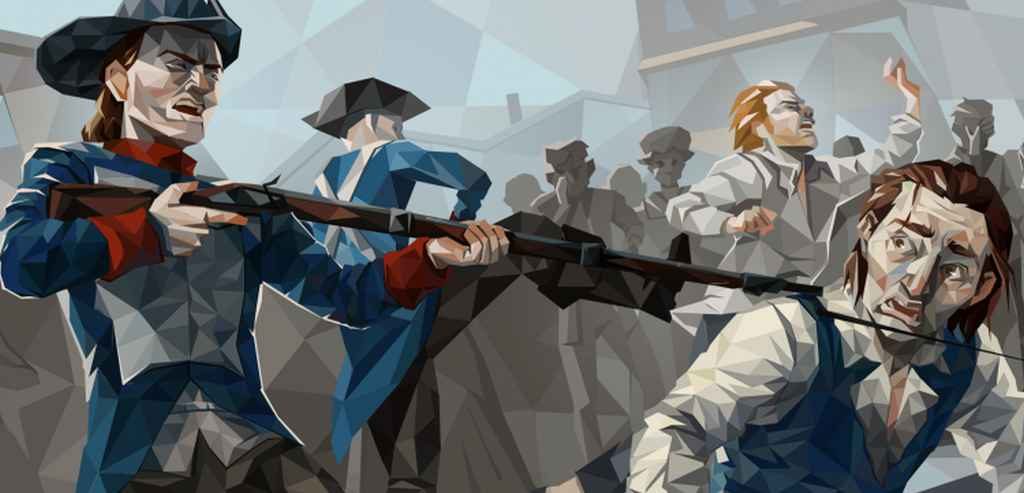A highly-original blend of courtroom drama and visual novel set amid the politically-charged atmosphere of the French Revolution: there really is nothing else like We. The Revolution on PS4.
Which isn’t to say it will appeal to everyone. Those who prefer to forgo diplomacy and solve their problems with a well-placed bullet to the skull will almost certainly be put off by the game’s sedentary, dialogue-heavy mechanics and gradually unfolding plot.
Those searching for something a little more thought-provoking, on the other hand, will discover a fascinating tale of political intrigue and social strife set against one of European history’s most compelling backdrops.
Indeed, the only thing holding it back is the overly simplistic nature of its central mechanic.
A Finely Orchestrated Story of Social Upheaval and Political Strife
Mechanical shortcomings aside, We. The Revolution is an exceptional game from a narrative standpoint.
In a nutshell, it tells the story of Alexis Fidele: drinker, gambler, family man, and, crucially, a judge of the Revolutionary Tribunal who finds himself thrust into the very heart of political life in late 18th century Paris.
Surrounded by volatile factions, led by some of the country’s most influential individuals, it’s Fidele’s job to try and preserve the rule of law in this seemingly ungovernable land. Whilst simultaneously protecting both himself and his family from the fires of revolution that threaten to consume the entire country.
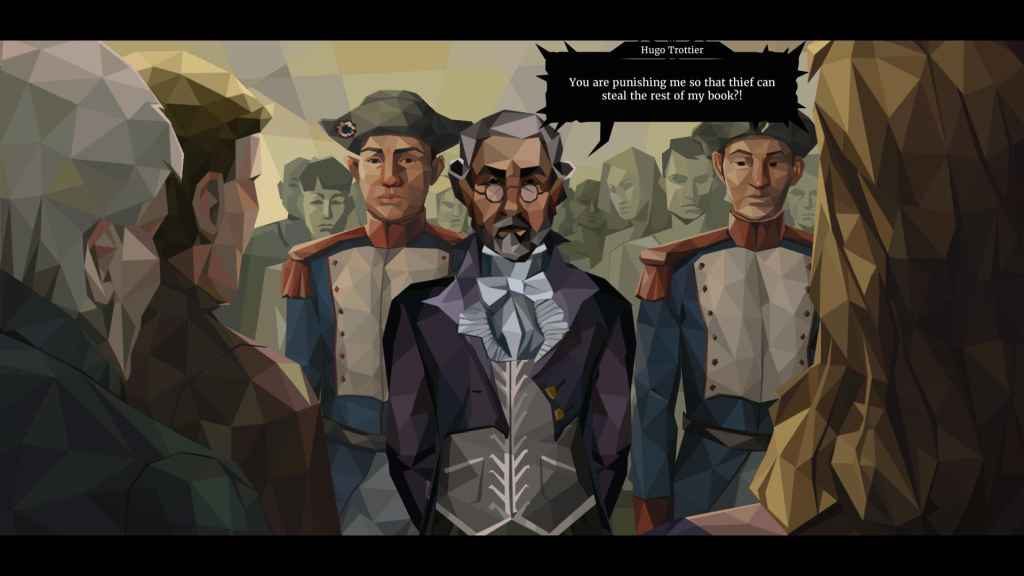
With so much to consider, We. The Revolution could so easily have devolved into a confused mess of competing narrative threads devoid of any kind of coherence. But it doesn’t. Instead, Polyslash succeeds in creating a complex, intricate, and ultimately compelling story that keeps the player invested in the characters and events on screen from the prologue right through to the end credits.
Part of that, a rather significant part, in fact, is the expertly crafted setting. An emotionally-charged crucible rife with uncertainty that leaves Fidele, and by extension the player, labouring over the most minute decisions; acutely aware that, whichever course of action they take, it’s simply impossible to please everyone.
And, in the world of the French Revolution, that can mean a sudden, brutal death.
The Courtroom Scenes Fail to Convince
Absorbing as it is, We. The Revolution is still a video game and is thus, at least to a certain extent, reliant on its core systems and mechanics when it comes to actually telling the story it wants to tell. The most important of these tasks the player with presiding over a number of procedurally-generated cases – from banal, everyday cases of theft concerning the lowest strata of Parisian society, to those of not just national, but international importance.
And, while many of these cases prove to be fascinating in their own right, giving the player genuine pause for thought as to the subjective nature of justice in such a fractious society whilst also providing additional background information on the game’s key figures, the player is afforded very little freedom when it comes to actually investigating them.
Once they’ve read through the case reports, witness statements etc. and pieced together the sequence of events, the player’s only real task is to ask the defendant a handful of questions. The problem is, these questions are set in stone; there’s no scope for the player to explore different avenues of inquiry should they uncover inconsistencies in the report or anything else that might point towards the defendant’s innocence.
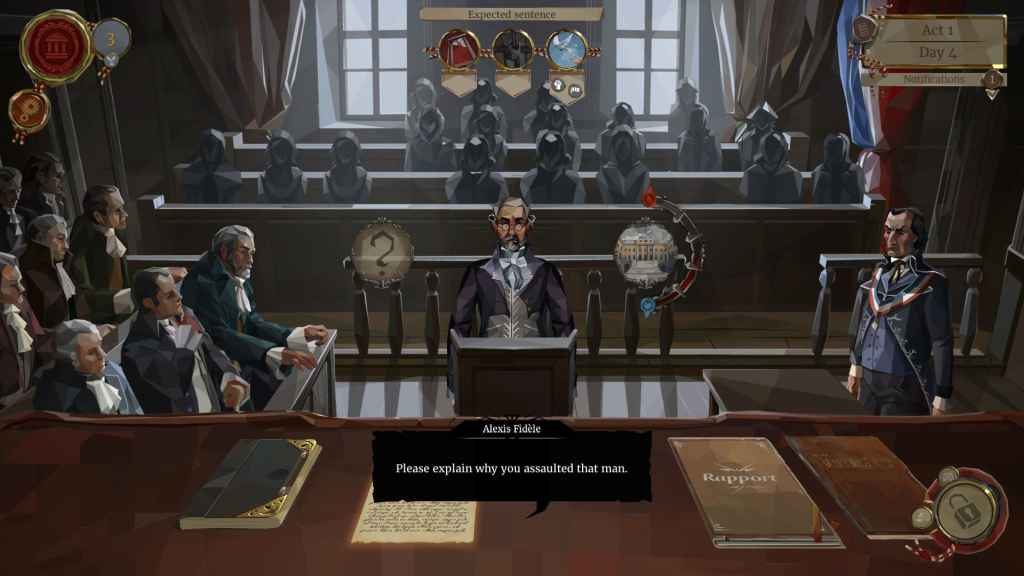
To make matters worse, actually unlocking these questions in the first place can be tricky. Aside from the fact that players are only permitted to make a handful of mistakes before they’re forced to progress to the next part of the trial, the connections between the events themselves and their place within the case are often rather arbitrary. Something that would surely fall under the heading of “motive” (the victim’s aristocratic status), for example, oftentimes turns out to be something completely, inexplicably different. “Method” being the most common alternative.
True, the generous autosave system lets the player restart the day should they fail to unlock even a single question. But this feels cheap; little more than save scumming. Moreover, it interrupts the narrative flow and completely breaks the sense of immersion.
Consequently, the player becomes a peripheral figure. A glorified narrator who’s only meaningful contribution is to pass sentence; in-line with the jury’s view of the case, of course. Unless Fidele wants to provoke accusations of corruption or despotism and thus risk winding up on the wrong end of the guillotine, he will almost always side with the jury or, at the very least, consider which faction is most in need of mollifying.
Thankfully, We. The Revolution Isn’t a One-Trick Pony
To be fair to the game, the lack of interactivity in these courtroom scenes would be slightly more of an issue if it wasn’t supported by plenty of far more engaging mechanics elsewhere.
Essentially a battle of wits between Fidele and his increasingly powerful political rivals, Intrigues offer an additional layer of tactical depth that is sorely missing in the courtroom. The player is free to approach each Intrigue in a variety of ways – using brute force to cower their adversary or less direct, more underhand tactics. With success or failure having a potentially profound effect on the course of the story.
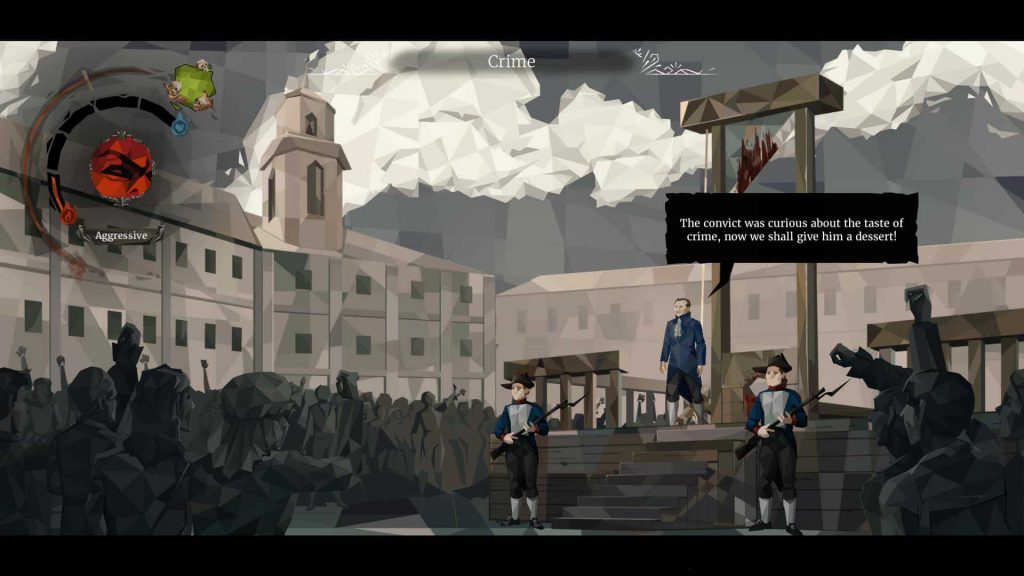
Players can also use Fidele’s diplomatic nous and oratorical prowess to win over raucous crowds or his political rivals, cultivate relationships with his often neglected family (something that mirrors the player’s overarching objective, i.e. maintaining the delicate balance of power within Paris), vie for control of the city and it’s numerous districts, and oversee rudimentary pitched battles that, while not quite as complex as the other mechanics mentioned here, provide yet another dash of diversity.
Together, they help bring the world of Revolutionary Paris to life; throwing the player headlong into a world that’s both so different and unnervingly similar to our own.
Fiddly Controls Can’t Quite Match the Precision of a Keyboard and Mouse
In terms of performance, We. The Revolution is something of a mixed bag. The HUD has been well configured on PS4. Intuitive and simple to navigate, with all key information (Fidele’s notebook, case reports, tactical map etc.) within easy reach of the player. The controls translate equally well from the PC version – in most cases.
Due to the heightened sensitivity of the analogue sticks during interrogations, players will find themselves accidentally selecting the wrong option with exasperating regularity. Thereby wasting one of the precious few mistakes they’re allowed to make when questioning the defendant and so reducing their chances of successfully unlocking all available lines of inquiry.
It’s particularly frustrating because this isn’t a problem elsewhere, for instance, when choosing between different dialogue options during Persuasions or Intrigues. It’s a relatively minor problem, admittedly. But something players should bear in mind if, they’re used to the greater precision afforded by keyboard and mouse.
We. The Revolution Boasts a Modest Yet Arresting Visual Style
One aspect of the game that certainly hasn’t suffered from the move to console, however, is the game’s uniquely arresting visual style.
Though it looks rather plain at first glance, We. The Revolution’s humble visuals possess a grittiness that perfectly encapsulates the fear, uncertainty, and oppressiveness of its captivating setting. The relatively low-poly stylised character designs similarly helping to distance the player from the events themselves which are, at times, rather brutal. Summary beheadings, rabid lynch mobs, and the like hardly make for pleasant Sunday afternoon viewing.
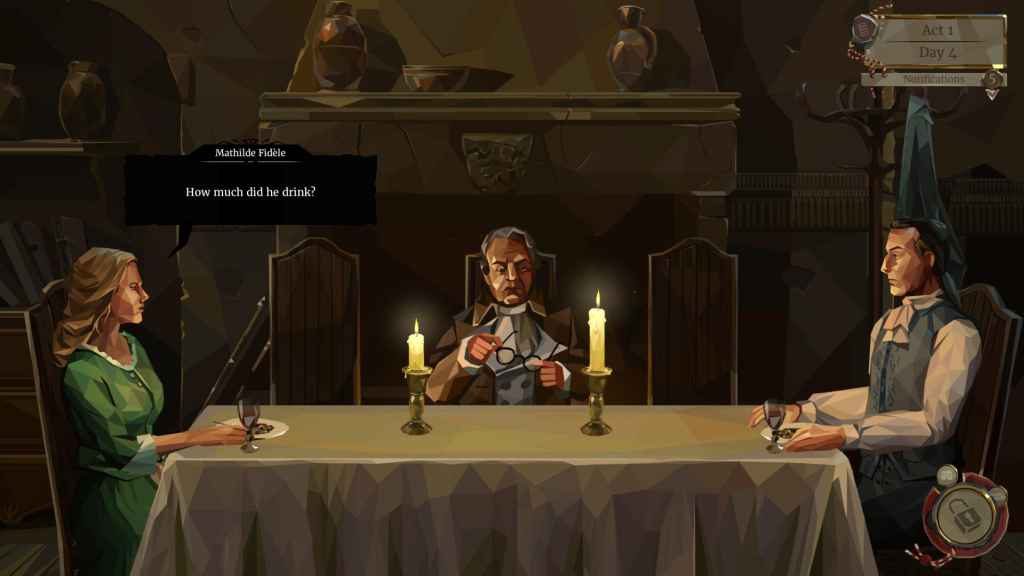
Like so many other indie hits, Polyslash embraces its artistic, eschewing the photorealism of its AAA counterparts in order to create something that both reflects the game’s themes and distinguishes it from everything else releasing this year.
There’s plenty to love about We. The Revolution.
The setting is second to none, while the complex, multi-layered plot is certain to appeal to anyone who prioritises narrative over action. It’s also one of the more stylish games released this year, utilising its modest visual style to maximum effect.
Nevertheless, it’s impossible to overlook the mechanical shortcomings of its trials which, when all’s said and done, lie at the very heart of the experience.
We. The Revolution is out now on PS4 was developed by Polyslash and published by Klabater, the latter of whom kindly provided us with our review copy.
